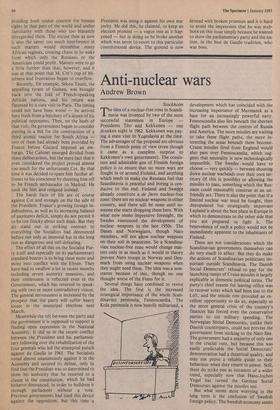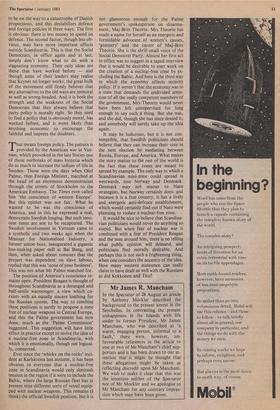Anti-nuclear wars
Andrew Brown
Stockholm
The idea of a nuclear-free zone in Scandi- navia was invented by two of the most successful statesmen in Europe — Presidents Tito and Kekkonen — one drunken night in 1962. Kekkonen was pay- ing a state visit to Yugoslavia at the time. The advantages of the proposal are obvious from a Finnish point of view (even though it came as a complete surprise to Kekkonen's own government). The consis- tent and admirable aim of Finnish foreign policy is to ensure that no more wars are fought in or around Finland, and anything which tends to make the Russians feel that Scandinavia is peaceful and boring is con- ducive to this end. Finland and Sweden already constitute a de facto nuclear-free zone: there are no nuclear weapons in either country, and there will be none until so- meone else starts dropping them here. With what now seems impressive foresight, the Swedes renounced the development of nuclear weapons in the late 1950s. The Danes and Norwegians, though Nato members, will not allow nuclear weapons on their soil in peacetime. So a Scandina- vian nuclear-free zone would change mat- ters only in as much as it would in theory prevent Nato troops in Norway and Den- mark from using nuclear weapons when they might need them. The idea was a non- starter because of this, though no one thought worse of the Finns for it.
Several things have combined to revive the idea. The first is the increased strategical importance of the whole Scan- dinavian peninsula, Fennoscandia. The Kola peninsula is now heavily militarised, a
development which has coincided with the increasing importance of Murmansk as a base for an increasingly powerful navy. Fennoscandia also lies beneath the shortest flight path between the centres of Russia and America. The more missiles are waiting to take these flight paths, the more in- teresting the areas beneath them become. Cruise missiles fired from England would also pass over Fennoscandia, which sug- gests that neutrality is now technologically impossible. The Swedes • would have to choose — very quickly — between shooting down nuclear warheads over their own ter- ritory (if this is possible) or allowing the missiles to pass, something which the Rus- sians could reasonably construe as an un- friendly act. There is also the point that if a limited nuclear war must be fought, then depopulated but strategically important Lapland is about the best place in Europe in which to demonstrate to the other side that you are prepared to fight it. The benevolence of such a policy would not be immediately apparent to the inhabitants of Finland.
These are not considerations which the Scandinavian governments themselves can do very much to affect. But they do make the actions of Scandinavian politicians im- portant outside Scandinavia. The Danish Social Democrats' refusal to pay for the launching ramps of Cruise missiles is largely explicable in domestic political terms. The party's chief reason for leaving office was to recover votes which had been lost to the Left, and the missile row provided an ex- cellent opportunity to do so, especially as the more general crisis of the country's finances has forced even the conservative parties to cut military spending. The Norwegian Social Democrats, unlike their Danish counterparts, could not prevent the government from sticking to the Nato line. The government had a majority of only one in the crucial vote, but because this was easily predictable the Social Democrats' demonstration had a theatrical quality, and may not prove a reliable guide to their behaviour when they return to power. Still, these do strike one as instances of a wider trend, especially now that Hans-Jochen Vogel has turned the German Social Democrats against the missiles too.
But what seems most worrying in the long term is the confusion of Swedish foreign policy. The Swedish economy seems
to be on the way to a catastrophe of Danish proportions, and this destabilises defence and foreign policies in three ways. The first is obvious: there is less money to spend on defence. The second factor, though less ob- vious, may have more important effects outside Scandinavia. This is that the Social Democrats, in office again and at last, simply don't know what to do with a stagnating economy. Their only ideas are those that have worked before — and though some of their leaders may realise that Keynes no longer works, the great bulk of the movement still firmly believes that any alternatives to the old ways are immoral as well as wrong-headed. And it is both the strength and the weakness of the Social Democrats that they always believe that party policy is morally right. So they need to find a policy that is obviously moral, has worked before, and is more likely than anything economic to encourage the faithful and impress the doubters.
That means foreign policy. The pattern is provided by the American war in Viet- nam, which provoked in the late Sixties one of those outbreaks of mass hysteria which do so much to increase the tedium of life in Sweden. Those were the days when Olof Palme, then Foreign Minister, marched at the head of an enormous demonstration through the streets of Stockholm to the American Embassy. The Times even called him 'the conscience of western Europe'. But this epithet was not fair. What he wanted to be was the conscience of America, and in this he expressed a real, democratic Swedish longing. But such inno- cent times are not to be recaptured. The Swedish involvement in Vietnam came to a symbolic end two weeks ago when the Minister for Nationalised Industry, a former union boss, inaugurated a gigantic loss-making paper mill at Bai Bang, and then, when asked about rumours that the project was dependent on slave labour, replied that this was 'none of your business'. This was not what Mr Palme marched for.
The position of America's conscience re- mains open. President Reagan is thought of throughout Scandinavia as a deranged and half-senile warmonger: a view which co- exists with an equally sincere loathing for the Russian system. The way to combine these positions is surely to propose a zone free of nuclear weapons in Central Europe, and this the Palme government has now done, much as the 'Palme Commission' suggested. This suggestion will have little effect in practice except to revive the idea of a nuclear-free zone in Scandinavia, with which it is emotionally, though not logical- ly, connected.
Ever since the 'whisky on the rocks' inci- dent at Karlskrona last autumn, it has been obvious to everyone that a nuclear-free zone in Scandinavia would only diminish tension in the region if it were to include the Baltic, where the large Russian fleet has at present nine different sorts of vessel equip- ped with nuclear weapons. This remains (I think) the official Swedish position, but it is not glamorous enough for the Palme government's spokesperson on disarma- ment, Maj-Britt Theorin. Mrs Theorin has made a name for herself as an energetic and formidable advocate of women's causes, `greenery' and the career of Maj-Britt Theorin. She is the shrill small voice of the Social Democrat Party. Almost her first act in office was to suggest in a taped interview that it would be desirable to start work on the creation of a nuclear-free zone by ex- cluding the Baltic. And here is the third way in which the economy affects security policy. If it weren't that the economy was in a state that demands the undivided atten- tion of all the really competent members of the government, Mrs Theorin would never have been left unsupervised for long enough to say such a thing. But she was, and she did, though she has since denied it, and somebody will surely take up the idea again.
It may be ludicrous, but it is not con- temptible, that Swedish politicians should believe that they can increase their vote in the next election by mediating between Russia, Europe, and America. What makes the story matter to the rest of the world is the fact that these zones are meant to spread by example. The only way in which a Scandinavian mini-zone could spread is westwards, into Norway and Denmark. Denmark may not matter to Nato strategists, but Norway certainly does: and because it is a free country, it has a lively and energetic anti-defence establishment, which would certainly find out if Nato were planning to violate a nuclear-free zone.
It would be nice to believe that Scandina- vian politicians would never do anything so stupid. But when fear of nuclear war is combined with a fear of President Reagan and the men around him, there is no telling what public opinion will demand, and politicians find morally desirable. And perhaps this is not such a frightening thing, when one considers the ancestry of the idea. How many western statesmen can really claim to have dealt so well with the Russians as did Kekkonen and Tito?



































 Previous page
Previous page